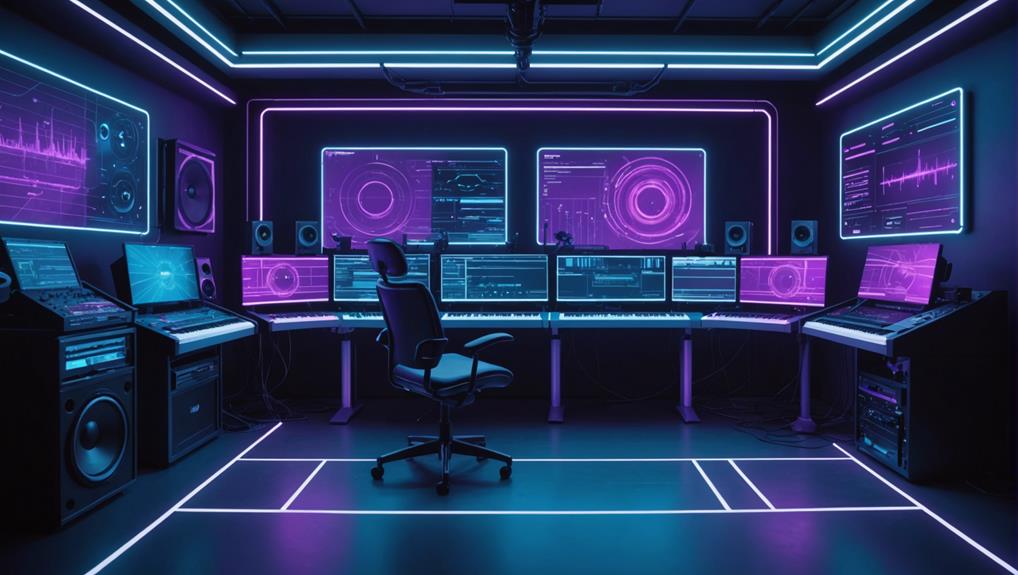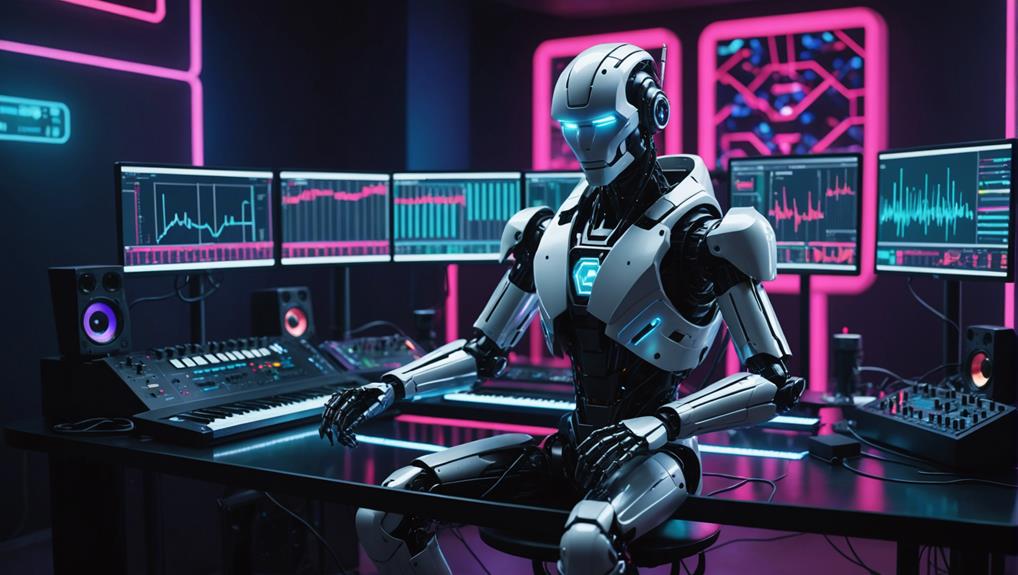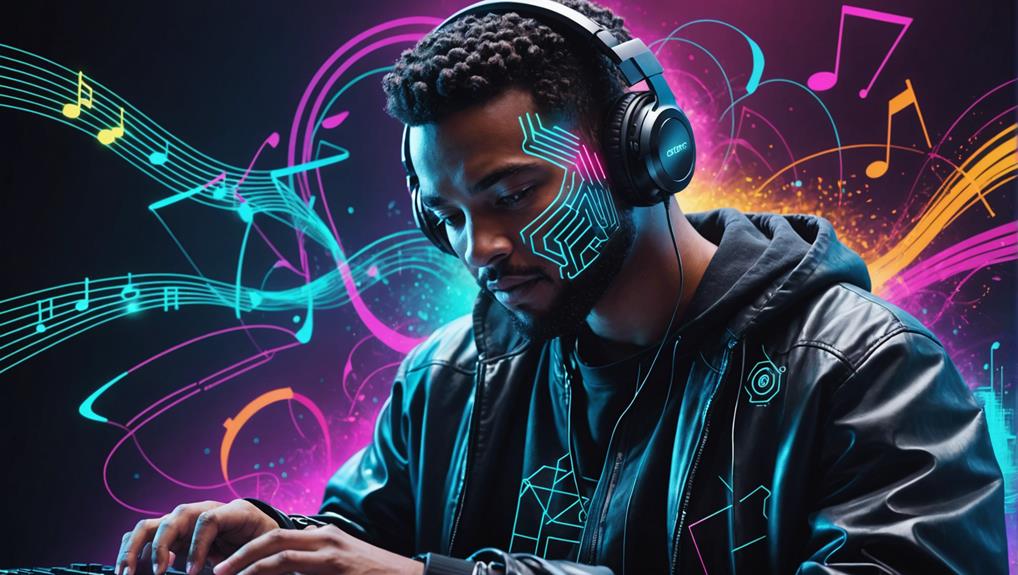No products in the cart.
You’re stepping into a revolutionary phase of music production powered by AI software. These tools use advanced machine learning to replicate real-world sounds and create rich, authentic soundscapes. They enable you to experiment with diverse sounds and styles, pushing genre boundaries effortlessly. Imagine harnessing AI to generate complex harmonies and progressions, enhancing creativity with limitless options. The technology optimizes audio clarity and balances levels, ensuring your tracks meet industry standards. From fine-tuning vocals to real-time performance customization, AI’s role in music is transformative. Keep exploring, and you’ll discover how AI continues to set new standards in music production.
Contents
hide
Key Takeaways
- AI-infused tools generate complex harmonies and melodies, expanding creative possibilities in music production.
- Advanced algorithms in AI software optimize audio quality, ensuring industry-standard outputs.
- Machine learning enhances efficiency by streamlining the music creation and collaboration processes.
- AI-driven virtual instruments and effects offer unprecedented versatility and authenticity in soundscapes.
- Personalized AI music software tailors production techniques and sounds to individual artistic styles.
AI-Infused Virtual Instruments
AI-infused virtual instruments now accurately replicate the complex sounds of real-world instruments like pianos and guitars, revolutionizing music production with their advanced machine learning algorithms. These tools have transformed the landscape of music creation, enabling you to produce rich and authentic virtual soundscapes. The innovations in music technology allow these instruments not only to mimic traditional sounds but also to explore new sonic possibilities that were once beyond reach.
With cutting-edge technology, these virtual instruments offer unmatched performance versatility. You’re no longer restricted by the limitations of physical instruments. Whether you’re looking for the warm undertones of a vintage guitar or the crisp, clear timbre of a grand piano, these AI-driven tools provide a diverse range of sounds. They simulate the nuances of different instruments with such precision that even the most discerning ears might struggle to tell them apart from their acoustic counterparts.
This continual improvement in AI technologies ensures that the range and quality of tones available are ever-expanding, making them indispensable for modern composers and producers seeking to push the boundaries of traditional music production. By tapping into this innovative toolset, you can craft complex orchestral arrangements and intricate harmonies with ease, paving the way for new creative explorations.
Intelligent Music Composition
As you explore intelligent music composition, you’ll find that AI software’s creative algorithm capabilities are revolutionizing how genres aren’t only defined but expanded. These advanced algorithms can analyze vast datasets to produce compositions that push traditional boundaries, ushering in a new era of genre diversity.
This shift allows you to experiment with and generate music that mightn’t have been possible before, tailored specifically to evolving listener preferences.
Creative Algorithm Capabilities
Harnessing AI software in music production, you can generate complex harmonies, melodies, and chord progressions tailored to your artistic preferences. These tools don’t just mimic traditional methods; they introduce a level of creative innovation and algorithmic creativity previously unattainable. By analyzing vast arrays of musical data, AI identifies underlying patterns, pushing the boundaries of what’s creatively possible.
Here’s a quick glance at what AI can do for you in music:
| Feature | Benefit |
|---|---|
| Pattern Analysis | Identifies compositional trends |
| Rapid Composition | Speeds up the creation process |
| Style Experimentation | Allows trials with various styles |
| Musical Concept Generation | Fosters innovative ideas |
| Endless Possibilities | Provides limitless creative options |
Embrace AI to redefine the musical landscapes you can explore.
Genre Diversity Expansion
Through intelligent music composition, AI software like MuseNet and Jukedeck enables you to effortlessly explore and expand your musical horizons across a diverse array of genres. These tools use deep neural networks and advanced algorithms to analyze patterns in music, allowing for the creation of AI-generated melodies that aren’t only unique but also highly adaptive to various musical tastes.
You can now experiment with genre-blending compositions that seamlessly merge classical with pop, jazz with hip-hop, or any other combination you can envision. This capability greatly broadens your creative scope, offering endless possibilities in music creation.
Embrace the power of AI in music production to push the boundaries of traditional genres and craft soundscapes that are truly your own.
Enhanced Audio Mixing
AI-powered audio mixing software revolutionizes how you balance audio levels, EQ frequencies, and optimize sonic clarity with its sophisticated algorithms. This marks a pivotal shift in the AI-driven audio enhancement landscape, setting a new standard for the future of mixing technology. The tools you now have at your disposal aren’t just tools; they’re your partners in crafting audio that reaches professional quality without needing years of technical experience.
These intelligent systems analyze and learn from tracks that have been mixed by seasoned professionals. This capability enables the software to apply similar processing to your music, ensuring that each element of your track is perfectly balanced and masterfully polished. Whether it’s the deep lows or the crisp highs, AI-enhanced audio mixing consistently delivers superior sound quality that might otherwise require multiple takes and adjustments by a human engineer.
Moreover, the advancements in AI mastering technology are nothing short of impressive. You get to choose: the unmatched efficiency and consistency of AI, or the nuanced, emotional touch of a human engineer. Either way, the end result is dramatically improved audio that stands up to industry standards, ensuring your tracks aren’t just heard, but felt.
Real-Time Collaboration
As you explore the world of AI in music production, consider how AI tools are transforming real-time collaboration.
They enhance remote team dynamics by seamlessly connecting musicians from various locations, allowing for instantaneous creative exchanges and feedback.
This not only streamlines the creative process but also injects a level of efficiency that traditional methods can’t match.
Enhancing Remote Team Dynamics
AI software has transformed how remote music production teams collaborate, enabling them to share and refine ideas in real time with precision and efficiency. With remote connectivity at its core, your team can engage in virtual workshops, pushing the boundaries of traditional studio settings. This technology not only bridges geographical gaps but also enhances the synchronous development of music tracks. You’re no longer bound by location; your studio is as vast as your network connection allows.
These AI tools empower you to manipulate song structures and production elements collectively, despite physical distances. The immediate feedback mechanism guarantees that every adjustment is perfectly aligned with the team’s vision, making your workflow smoother and far more dynamic.
Streamlining Creative Exchanges
Harnessing the power of AI, you can now engage in real-time collaborative music production, sharing and refining ideas instantly across any distance. This technology facilitates remote jamming sessions and virtual songwriting, allowing you and your fellow musicians to seamlessly exchange ideas and instant feedback on song structures, vocal performances, and arrangements.
The AI-driven platforms enhance your creative process by providing insights and suggestions that help refine your compositions during these collaborative sessions. This not only makes your teamwork more efficient but also greatly improves the outcomes of your music production.
With AI, you’re equipped to create music in a dynamic, interactive virtual environment, transforming how collaborative music is conceptualized and produced.
Personalized Recommendation Engines
Personalized recommendation engines analyze your listening habits and preferences to deliver music suggestions that are uniquely tailored to your tastes. Through sophisticated AI algorithms, these engines enhance user engagement and personalized curation, guaranteeing that every musical suggestion resonates more profoundly with your personal style and mood.
Here’s how these recommendation engines benefit you:
- Tailored Playlists: By understanding your favorite genres, artists, and songs, AI creates playlists that feel custom-made for you.
- Discovery of New Music: You’re introduced to tracks and artists that you mightn’t have discovered on your own but match your musical preferences.
- Adaptive Learning: The more you listen, the smarter these systems get, refining recommendations based on your feedback and evolving tastes.
- Mood Matching: Whether you’re feeling upbeat or need soothing tunes, the system adjusts its suggestions to match your current mood.
These features not only make your music listening experience more enjoyable but also deepen your connection to music by constantly offering fresh and relevant content. As you dive deeper into the world of music, these personalized engines ensure your journey is as diverse as it’s engaging.
Interactive AI Learning
Exploring interactive AI learning platforms like Flow Machines and IBM Watson Beat, you can actively participate in the creation of unique musical compositions by analyzing and utilizing data patterns. These platforms empower you to take control of AI melody creation, integrating your own artistic input to shape the music’s direction. By inputting your preferences and styles, the AI adapts and generates melodies that align with your creative vision.
Furthermore, the process doesn’t stop at melody. AI collaboration extends to drum pattern generation, where you can experiment with rhythms and beats, pushing the boundaries of traditional music production. Platforms like Amper Music further enhance this experience by offering you tools to manipulate these elements in real time, fostering a deeply interactive and responsive creative process.
As you engage with these AI systems, your role evolves from a mere observer to an active participant. The music that emerges isn’t just AI-generated but is a product of a symbiotic relationship between your creative flair and the AI’s computational power. This collaboration doesn’t just enhance your musical output; it revolutionizes the way music is created, making it more personalized and expressive than ever before.
AI-Driven Vocal Enhancement
AI-driven vocal enhancement tools like iZotope’s Nectar and Waves Tune Real-Time frequently fine-tune your vocal tracks by adjusting pitch, timing, and tone in real time. These innovative tools leverage advanced AI algorithms to analyze and optimize your vocal performance, ensuring every note you sing is pitch-perfect and full of expression. They’re designed to polish your vocal tracks, enhancing both clarity and vocal expression without compromising the natural texture of your voice.
Here’s how these tools transform your singing into a flawless performance:
- Pitch Correction: Instantaneously detects and corrects pitch discrepancies, ensuring your vocals are in perfect harmony with the music.
- Timbre Adjustment: Modifies the tone of your voice to suit the song’s genre and mood, enhancing the emotional impact of your vocal expression.
- Dynamic Processing: Balances the loudness, reduces unwanted noise, and applies compression to smooth out the vocal performance.
- Temporal Alignment: Aligns and adjusts the timing of your vocal tracks, ensuring tight synchronization with the backing instruments for performance optimization.
AI in Live Performances
Building on in-studio technology, AI now also revolutionizes live performances by analyzing audience reactions in real time, allowing performers to instantly tailor their shows for enhanced engagement. This seamless integration of AI into live settings empowers artists with real-time feedback, enabling them to adjust not just setlists but also the tempo and energy of their performances. This dynamic customization is at the forefront of live performance innovations, transforming how concerts are experienced.
The AI systems deployed during these live events are equipped with sophisticated algorithms capable of interpreting various audience metrics—such as applause volume, facial expressions, and movement patterns. These data points are analyzed instantaneously to gauge the crowd’s mood and engagement levels. Based on this information, performers can modify their approach or even interact more directly with the audience, applying tailored audience engagement strategies.
Moreover, AI enhances the sensory aspects of live shows by synchronizing lighting and visual effects with the live music, creating truly immersive experiences. These AI-driven enhancements ensure that each performance isn’t only unique but also deeply resonant with the audience, making live events more interactive and enjoyable. Through such innovations, AI is setting new standards for how live music is performed and experienced.
AI and Music Copyright Concerns
AI-generated music introduces significant copyright concerns, particularly around issues of ownership and originality in the industry. As you navigate these waters, it’s essential to comprehend the intricate dynamics at play.
Here’s what you need to take into account:
- Ownership Clarity: Who holds the rights to AI-generated music? Unlike traditional compositions, where copyright is attributable to human creators, AI compositions blur these lines. You must determine if the AI programmer, the user, or potentially the AI itself could claim ownership.
- Originality Verification: Ensuring that AI-generated music doesn’t infringe on existing works is crucial. Advanced algorithms can mimic styles and patterns, leading to potential legal challenges from original creators who might see these works as derivative.
- Copyright Law Adaptation: Current copyright frameworks weren’t designed with AI in mind. They require human authorship as a basis for protection. Legislators and industry stakeholders need to consider reforms that acknowledge AI’s role in creative processes.
- Ethical and Legal Boundaries: The ethical implications of AI-generated music and the necessity for copyright protection for AI composers are pivotal. Balancing innovation with fair compensation and recognition for human artists is a delicate task.
Navigating these issues requires a blend of legal insight, ethical consideration, and innovative thinking to redefine copyright norms in the music industry.
Frequently Asked Questions
How Is AI Revolutionizing the Music Industry?
AI is transforming the music industry by enabling artist collaboration and raising copyright implications. It streamlines composition, offers innovative tools, and democratizes music production, greatly altering traditional creative processes.
How Is AI Being Used in Music Production?
AI is utilized in music production through creative algorithms that generate melodies and harmonies. You’ll find AI collaborations enhancing compositions with intelligent suggestions, streamlining processes with innovative virtual instruments and diverse soundscapes.
Will Music Producers Be Replaced by Ai?
You won’t be replaced by AI; instead, you’ll use it to tackle creative challenges and reshape job implications in music production, enhancing your skills and pushing the boundaries of what’s possible creatively.
Can I Create Music Using Ai?
Yes, you can create music using AI. Tools like Flow Machines expand AI accessibility, pushing creative boundaries. They assist in composing by generating melodies and harmonies, enhancing your music production with innovative, technical expertise.
Conclusion
As you embrace AI in music production, you’ll find that AI-infused virtual instruments and intelligent composition tools streamline your creative process. Enhanced audio mixing and real-time collaboration capabilities allow you to refine tracks with unprecedented precision.
Additionally, personalized recommendation engines and interactive AI learning systems tailor solutions to your unique style. However, remain vigilant about AI-driven vocal enhancements and live performance tools to guarantee authenticity.
Always consider the implications of AI on music copyright laws to safeguard your work.




